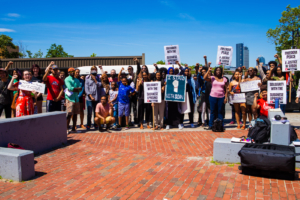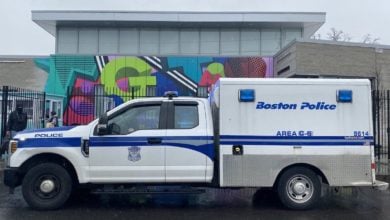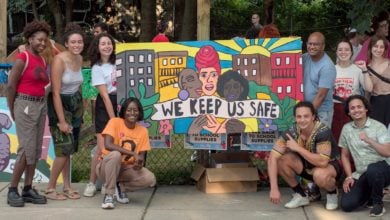Since December 2018, the people of Sudan have been waging a struggle against their comprador military government. Despite toppling two presidents — Omar al-Bashir, who had controlled the country for 30 years, and Awad Ibn Ouf, al-Bashir’s military successor who stepped down after only 24 hours — the Sudanese revolutionaries still face immense challenges. The country is currently governed by a Transitional Military Council, which is controlled by many of al-Bashir’s top military generals. The TMC has cracked down brutally on the peaceful demonstrators, most notably during a June 3 massacre in Khartoum. As the struggle continues on the ground, Sudanese revolutionaries have requested increased international solidarity.
In response to this call, ANSWER Boston (Act Now to Stop War and End Racism) organized a vigil and speak-out on Saturday June 15. About 50 people gathered outside of the Roxbury Crossing MBTA station to display their solidarity. Demonstrators held signs that read, “Solidarity with the Sudanese uprising” and “Wrench the power from the hands of the military!”
The demonstration began with a moment of silence to mourn the lives taken by al-Bashir’s government and the TMC. However, ANSWER organizers emphasized that in addition to mourning, a core goal of the demonstration was to celebrate and learn from the heroic struggle of the Sudanese people. ANSWER organizer Nino Brown noted, “Sudan doesn’t need our charity or pity. It needs our solidarity. Part of solidarity is listening and learning. We need to listen and learn from Sudan and their revolution. They are far ahead of us.”
A number of speakers addressed the crowd to explain the context and goals of the uprising, which has been inaccurately portrayed as solely a struggle for “democracy” by much of the mainstream corporate media. Sarah Elbakri, a Sudanese resident of Boston and one of the organizers of the demonstration, explained the impetus for the uprising:
“This regime has been upheld so long through violent repression of people. This was enforced through the Sudanese government, but also through the militia known as the Janjaweed or Rapid Support Forces… Conditions became unbearable. The price of food, fuel and basic necessities continued to increase drastically — not to mention life in areas like Darfur and South Sudan where it’s been unbearable for decades. A protest was led by high school students in a town, Atbara, on December 15, 2018, that started because they came to school and found that their lunch prices had doubled overnight. This protest is actually what sparked the revolution and the protests that have been happening across the country since December.”

The cost of living increases are directly related to cuts to subsidies that the al-Bashir regime implemented in collaboration with the International Monetary Fund. ANSWER organizers noted that although the implementation of a democratic civilian government is a key demand of the revolutionary movement, other central social and economic demands have been glossed over in mainstream coverage. Corporate media emphasizes the vague concept of “democracy” while erasing demands such as the social empowerment of women and government investment in health, education and housing. “We must be on guard against attempts by the corporate owned, Pentagon directed, mainstream media to privilege one voice of resistance over the others for their own nefarious ends,” said Nino Brown. “The same imperialist and colonialist forces that propped up the old government cannot be involved in any genuine solution in Sudan. The British and the U.S. have historically carved up Sudan, pitting ethnic group against ethnic group and trampled on Sudan’s right to self-determination… We cannot allow these American and European bloodsuckers to dominate the narrative of Sudan.”
Rachel Domond from the Party for Socialism and Liberation was the event’s final speaker. Domond stressed the importance of understanding the events in Sudan within the broader context of imperialism. “We must fight the presentation of global issues being isolated incidents and instead connect them to each other. Time and time again, the Sudanese Communist Party — a prominent force in the rebellion — has called for the intensification of international solidarity. So, what are we doing in the United States, as inhabitants of the most powerful global oppressor, to support the struggles for sovereignty in colonized and neo-colonized nations? We must uphold the truth that the workers struggle has no borders, and stand alongside our global siblings!”
After the scheduled speakers concluded, the mic was opened up to members of the crowd. A Sudanese community member recited a poem by Mahjoub Sharif, Sudan’s “poet of the people.” One of the lines encapsulates the need for continued mass action and international solidarity: “It’s not the bullet that kills, what kills is the silence of the people.”






